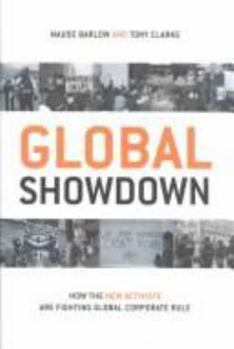Global Showdown: How the New Activists Are Fighting Global Corporate Rule
Select Format
Select Condition 
Book Overview
On 29 November 1999, few people knew what WTO - World Trade Organization - stood for. The next day, however, after the Battle of Seattle, the WTO became a household name, particularly in Britain on... This description may be from another edition of this product.
Format:Hardcover
Language:English
ISBN:0773732640
ISBN13:9780773732643
Release Date:January 2002
Publisher:Stoddart
Length:208 Pages
Weight:1.13 lbs.
Dimensions:0.9" x 6.4" x 9.1"
Related Subjects
Biography & History Business Business & Investing Company Profiles Economic Conditions Economics Finance International Management & Leadership Political Economy Political Science Politics & Government Politics & Social Sciences Public Affairs & Administration Public Affairs & Policy Strategy & CompetitionCustomer Reviews
1 rating
A Commentary by David Orton
Published by Thriftbooks.com User , 19 years ago
By David Orton, July 15, 2001, Published in the September 2001 edition of the online magazine of the New Brunswick Environmental Network, "Elements" This commentary will outline why I think this book is important, explain the critique in Global Showdown,and bring out what seems to me to be some of the important questions, which reading this book raises for the radical, deep ecology-influenced environmental movement. First, one has to say that this book is an excellent source of information on the various corporate structures which are trying to make the world safe for international Capital - for example the World Trade Organization, the International Monetary Fund, the World Bank - and the ideas of the mainstream groups in opposition to this. I agree with the authors when they note that "civil society politics are the politics of the twenty first century." (p. 5) Although most of us reading this commentary share an opposition to the belief that trade is the supreme good, there is an ongoing discussion on what will be the nature of such politics. This book advocates a mainstream view of civil society politics that ultimately can be accommodated within industrial capitalism. (The People's Summit in Quebec City in April of 2001, was partly financed by the federal and Québec governments.) Global Showdown shows the historical emergence of global economic institutions and, following the ending of the Second World War, how United Nations supervision of such institutions was replaced by US control, with what has come to be called "The Washington Consensus." "Led by American business interests, the free-market doctrine would eventually force most governments in the world to give up controls on foreign investment, liberalize trade, deregulate their internal economies, privatize state services, and enter into head-to-head global competition." (p. 57) Because of the necessary exposure of the labyrinth corporate and bureaucratic structures which underpin the ever expanding globalization of Capital, this book is not easy, although it is essential reading. Maude Barlow is the chairperson of the Council of Canadians. Barlow has played a major role in educating and arousing Canadians to fight back against the forces of globalization and increasing corporate governance. Anyone who has heard her speak, knows she is a very effective and knowledgeable speaker, who "eats up" the apologists for more unrestricted free trade. Tony Clarke is the director of the Polaris Institute of Canada. This institute, which emerged in 1997, describes itself in its mission statement as seeking "to provide a compass for social movements", in order "to bring about democratic social change" in this era of corporate driven globalization. Both authors know their stuff, and reading th




